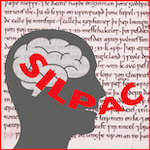Events
SILPAC Colloquium
Workshops & Conferences
-
Working with corpora (1 April 2022, University of Mannheim)
-
Tolerance principle workshop (7–8 April 2022, University of Stuttgart)
-
Python workshop (30 June–1 July 2022, University of Mannheim)
-
R Bootcamp (24–28 October 2022, University of Mannheim)
-
Event structure in contact (12 April 2024, University of Mannheim)
-
Diachronic Generative Syntax (DiGS 25) (25–30 June 2024, University of Mannheim)
Talks
- Tara Struik: Information Structure triggers for word order variation and change: the OV/VO alternation in the West-Germanic languages (31 March 2022, University of Mannheim) [Slides (PDF)]
- Charles Yang: A Decision Procedure (31 March 2022, University of Mannheim)
- Charles Yang: A Discovery Procedure (7 April 2022, University of Stuttgart)
- Ailís Cournane (New York University): Exploring the role of first language acquisition in language change phenomena (15 September 2022)
- Elly van Gelderen (Arizona State University): Language acquisition and language change (22 September 2022)
- Michelle Troberg (University of Toronto Mississauga): Result and Motion in Medieval French: Changes in the structure of the input? (29 September 2022)
- Hendrik de Smet & Marie-Anne Markey (KU Leuven): Cruising, off-roading but no parking (6 October 2022)
- Eva Zehentner (University of Zurich): PP-constructions in the history of English: Categorisation and competition (13 October 2022)
- Robert Hartsuiker (Ghent University): Cross-linguistic structural priming: the role of word order (3 November 2022)
- Gerrit Jan Kootstra (Radboud University Nijmegen): Cross-language structural priming as a mechanism of language contact: short-term and long-term effects (10 November 2022)
- Barbara Schirakowski (FU Berlin): Event structure in language contact: Manner, result and French-English bilingualism (18 January 2024)
- Yung Han Khoe (Radboud University): Bilingual syntax as error-based implicit learning (25 January 2024)
- Christoph Scheepers (University of Glasgow): Syntactic Priming of Relative-Clause Attachments: Implications for the Mental Representation of Syntax (15 February 2024)
